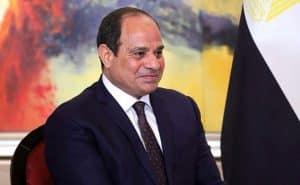On 6 March, Egypt sentenced fourteen people, including rights activists, to prison on terrorism-related charges stemming from their human rights work in a trial deplored by rights groups as unfair. The fourteen defendants have been arbitrarily detained for over four years, with most arrested in a series of raids carried out by security forces in late 2018.
The defendants include Ezzet Ghoneim, founder of the human rights organization Egyptian Coordination for Rights and Freedoms, human rights lawyer Hoda Abdelmoniem, Aisha el-Shater, the daughter of a prominent Muslim Brotherhood leader, and her husband lawyer Mohamed Abo Horeira. The fourteen individuals have been arbitrarily detained since 2018 and are being tried by an Emergency State Security Court, which has involved gross violations of their right to a fair trial. “This politically motivated trial by an emergency court marks just the latest attempt by the Egyptian authorities to silence this group of human rights defenders, lawyers and actual or perceived state critics. These 14 individuals have been detained simply for exercising their human rights. They should be immediately released and all charges against them dropped,” said Philip Luther, Amnesty International’s Research and Advocacy Director for the Middle East and North Africa.
Cruel conditions
Amnesty International found that all have been subjected to enforced disappearance for periods op to three months, in which time the authorities refused to reveal their whereabouts to their families. Security forces subjected thirteen of the detainees to torture or ill-treatment while held at facilities controlled by the National Security Agency (NSA), including severe beatings, electric shocks, sexual violence, and threats to sexually assault or imprison their family members. During interrogations, security officers asked many of them about their alleged affiliation to the Muslim Brotherhood and forced them to “confess” under torture.
A number of the detainees made official complaints about their enforced disappearance and torture to Supreme State Security Prosecution (SSSP) prosecutors, yet the allegations were not investigated. Ibrahim Atta, one of the defendants, told prosecutors he was subjected to beatings and electric shocks, including to his testicles and tongue, suspended in contorted positions and denied food, water and access to a toilet for four days. Authorities have also deliberately denied Hoda Abdelmoniem and Aisha el-Shater access to adequate healthcare despite suffering from life-threatening conditions.
Large-scale repression
The verdicts are not subject to appeal and only Egypt’s president has the authority to pardon or throw out the senctences. Rights groups have repeatedly criticized mass sentencings, common over the past years in Egypt in trials related to the Brotherhood or dissent, and called on authorities to ensure fair trials. Egypt’s government has in recent years jailed thousands, mainly Islamists, but also secular activists involved in the 2011 Arab Spring uprising that toppled the country’s longtime autocratic President Hosni Mubarak.
The mass sentencing is the last example of the Egyptian authorities’ attempt to silence human rights defenders and anyone deemed to be affiliated with the Muslim Brotherhood. In the aftermath of the Arab Spring uprising that toppled the country’s longtime autocratic president Hosni Mubarak, thousands of people have been jailed. The international community must take action to ensure that the rights of Egyptian citizens are respected and that those responsible for unlawful disappearances and torture are held to account. At the moment, Egypt counts a baffling 60,000 estimated political prisoners. It is highly important the international democratic community does everything in its power to give attention to Egypt’s repressed human rights defenders, and prevents the normalization of the dictatorial Sisi regime.
Author: Manouk Bronzwaer



